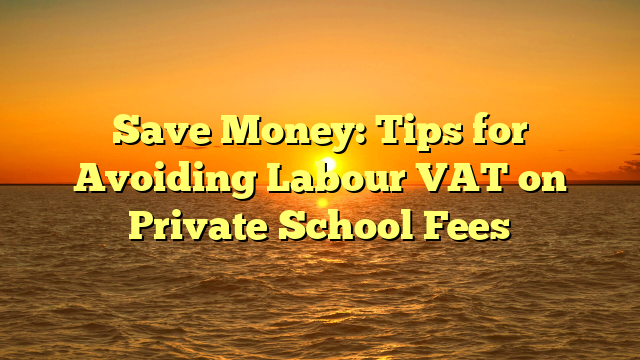Private schools offer a unique and often coveted education experience, with smaller class sizes, specialized programs, and a rigorous curriculum. However, this comes at a cost – private school fees can be significantly higher than those of public schools. To make matters worse, private schools are subject to value-added tax (VAT) in many countries, which can add an additional financial burden to families already struggling to afford the steep tuition fees. In this article, we will explore the concept of labour VAT, its impact on private school fees, and most importantly, how to avoid it.
What is labour VAT and why is it applied to private school fees?
Value-Added Tax, commonly known as VAT, is a tax on the consumption of goods and services. It is a secondary tax, meaning it is paid by the final consumer of a product or service, rather than the businesses supplying them. It is a widely used taxation system in many countries worldwide, including most European and Asian countries.
Labour VAT, also known as services VAT or reverse charge VAT, is a type of VAT that is applicable to services rather than goods. In many countries, private school fees are considered a service, and therefore, they are subject to labour VAT. This means that the private school needs to pay VAT on their services, which in turn, gets passed on to the parents in the form of higher tuition fees. This causes a significant strain on families trying to provide their children with a private school education.
So, how can families avoid this added financial burden?
Here are some ways to navigate the complicated VAT system and reduce or even avoid labour VAT on private school fees:
1. Choose a non-profit or charitable private school:
One way to avoid labour VAT on private school fees is to choose a non-profit or charitable private school. In many countries, non-profit organizations and charities are exempt from paying VAT on their services. This means that private schools with non-profit or charitable status are not required to charge VAT on their tuition fees, making them more affordable for families.
Furthermore, non-profit private schools often have lower tuition fees compared to for-profit private schools, as their primary focus is on providing education rather than making a profit. This can provide significant savings for families while still providing a high-quality education for their children.
2. Look into VAT exemption or zero-rating schemes:
In some countries, private schools may be eligible for VAT exemption or zero-rating schemes. This means that they do not have to pay VAT on their services, and therefore, they cannot pass it on to the parents. However, eligibility for these schemes may vary, and it is crucial to check with the local tax authorities to see if your private school qualifies for such exemptions.
3. Consult with a tax advisor:
Navigating the complexities of VAT laws can be challenging, and often, it is best to consult with a tax advisor who has expertise in this area. A tax advisor can review your private school’s VAT status and provide guidance on any exemptions or schemes that may apply. They can also help you determine the best course of action to reduce the impact of labour VAT on your private school fees.
4. Pay tuition in advance:
In some countries, private schools offer a discount for paying tuition fees in advance for the entire academic year. This can save families a significant amount of money, as they may be able to avoid paying VAT altogether on their child’s tuition fees. Therefore, it is worth considering if your private school offers such a discount, as it can provide significant savings in the long run.
5. Consider scholarships or financial aid:
Many private schools offer scholarships or financial aid to families who may struggle to afford the tuition fees. These programs may also be available to families who are subject to labour VAT on their private school fees. It is worth inquiring about such opportunities with your private school, as they can provide much-needed financial relief.
6. Look into payment plans:
If paying tuition fees in one lump sum is not feasible, families can consider talking to their private school about payment plans. These plans allow families to spread out their payments throughout the academic year, making it easier to manage their finances. Moreover, some private schools offer these plans interest-free, which can save families from paying additional fees on top of the VAT.
In conclusion, private school fees can already be expensive, and the additional burden of labour VAT can make them unaffordable for many families. However, by choosing a non-profit or charitable private school, looking into VAT exemption or zero-rating schemes, consulting with a tax advisor, paying tuition fees in advance, considering scholarships or financial aid, and exploring payment plans, families can reduce or even avoid labour VAT on their private school fees. It is essential to do your research and seek expert advice to find the best solution for your family’s financial situation. After all, your child’s education should not come at the cost of financial strain.

Comment Policy:Your words are your own, so be nice and helpful if you can. Please, only use your real name and limit the number of links submitted in your comment. We accept clean XHTML in comments, but don't overdo it, please.Let's have a personal and meaningful discussion.